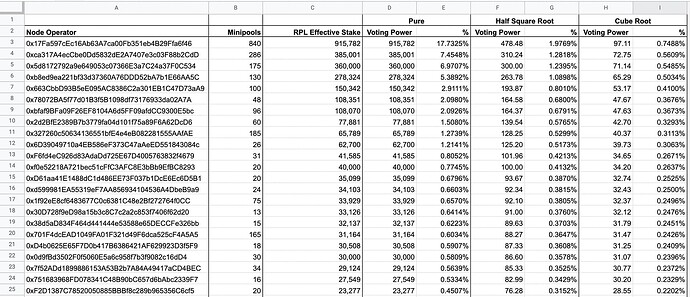My main question is… how will allnodes users be able to vote, in absence of a CLI? On snapshot.org? Will there be a web3 ui for them to select a delegate?
The Snapshot UI allows you to set a delegate for a Space, so delegates can still be set however this comes with an increased risk exposure.
For example, if the community are happy with the Cubed Root Stake strategy, we would apply
- Cube Root Effective Stake
to the Snapshot space and all proposals would use these strategies for voting.
Cube root effective stake is fine!
I would favour the Cube Root Effective Stake option. Comes closest to one person - one vote in my opinion.
I would lean towards straight Sqrt but half square is fine.
I would argue against cube rt or lower however as at that point you are providing very high motivation to split nodes for the purpose of voting. This would make individuals harder to identify and reduce future options for penalising RPL stake based on node rather than minipools.
It also dis-proportionally reduces the voting power of the early and very highly aligned whales with one or a few nodes in favour of later entrants who will know the benefit of splitting nodes and act accordingly.
I agree with Uisce here. Even with half square, thomasg vote is only 60x that of someone with one minipool and low collateral. That is far from whales dominating votes.
One person - one vote isn’t doable without sybil resistance and I fear that trying too hard will have the opposite effect in that a whale could dominate by creating many nodes.
Square root looks good to me.
Theoretical support for this being efficient
See Quadratic Vote Buying, Square Root Voting, and Corporate Governance and related.
Of course, that doesn’t handle the idea of folks splitting their stake to maximize voting power, but that’d be an extreme challenge without massive complexity.
Minor: Why is it half square root? It seems like dividing all the numbers by 2 doesn’t change anyone’s relative voting power? Seems like wasted math unless I’m missing something.
+1 for half square root
Yes, there is really no difference between half square root and square root.
My vote would be for the squared option. I am biased in this vote because of the position that I have taken in RPL.
I agree with knoshua that multiplying and nth root number by a constant (1/2) does not change the relative voting power of results.
Maybe the intent was to have 1/2-squared mean to use the 2.5th root of the eff RPL staked? Sort of the compromise between squared and cubed root? - If so I could live with that.
Seems like wasted math unless I’m missing something.
Excellent point, scalers are wasted math here. Either I misunderstood langers’ original suggestion, or he just took a very quick look at the squished function graph without thinking too hard (exactly what I did).
With some thought, we may be able to come up with a more custom function that boosts small nodes and reduces very large nodes without incentivizing node splitting too much, but I’m not sure it’s worth the effort. 2.5 root seems like a good compromise to me, but I’m happy as long as we’re using a root function of some sort.
I also support the half square root method
I support the square root
I also think square root weighting would be best
Cube root has my vote!
square root until some form of sybil resistance can be determined. too much incentive for selfish or even misaligned groups to spin up multiple single minipools.
I vote for square root, as it has the best balance between equity and efficiency.
Square root gets my vote.
If you haven’t seen, lido is exploring a dual governance model where holders of the liquid staking derivative have the option to veto decisions of the governance token:
https://research.lido.fi/t/ldo-steth-dual-governance/2382
I think it’s a pretty interesting approach and it might be useful for rocket pool as well when it comes to designing on chain governance. Node operators would generally be making decisions and reth having veto rights makes sure that they keep the reth perspective in mind and protects against the protocol being attacked.
